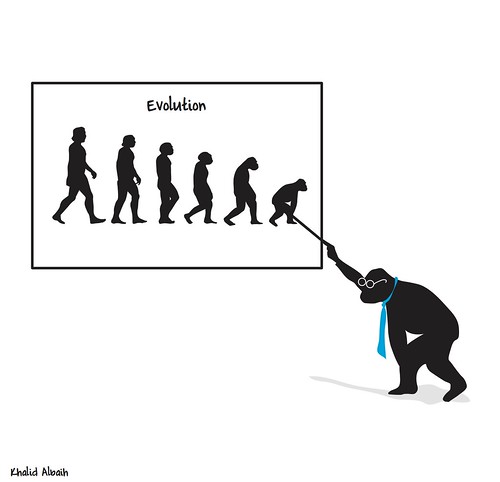This week we were assigned the task of exploring the Common Sense Media website, reading chapter one of Shalom Fisch’s book, and reading Audrey Watter’s post. We were also asked to unpack a very loaded Postman statement.
I must start by saying that I enjoyed all the readings, particularly the opportunity to explore Common Sense Media’s website. I researched my 2 1/2 year old daughter’s favourite shows with family and friends. While exploring the website, we had great discussions about how the role of parent-child co-viewing has evolved and how society’s expectation for ‘ quality educational’ programming has increase since my childhood.
 Thomas Hawk Flickr via Compfight cc
Thomas Hawk Flickr via Compfight cc
When Postman states that Sesame Street undermines what the traditional idea of schooling represents, I believe he is referring to technology as being a trade-off. Postman states that with “every advantage a new technology offers, there is always a corresponding disadvantage.” On one hand, I agree. Postman explains that “ (s)ome critics have argued that exposure to television-even educational television-can lead to outcomes such as reduced attention spans, lack of interest in school (because teachers do not sing and dance like characters on television), or children becoming passive “zombie viewers”.” As a French immersion kindergarten teacher, I have often felt like I am a character in a Disney movie for most of my day. Almost everything I do has a song and actions associated with it. For example, I have a line up song, a wash your hands song, a clean up song, a snack time song, a come to the carpet song, etc. Is my day-to-day reality perhaps the trade-off that Postman alludes to? In order to hold student’s attention in class, must I sing and dance and entertain them? I would argue that if this is how children learn best, through song, dance and the teacher being an entertainer, then this is how teachers should be teaching. So this answers his question “what will technology do”. The next question “ what will technology undo” deserves to be examined.
I will start with the social implications on our culture. Sesame Street allows children to watch a conflict unfold and shows how it can be fixed.
What Sesame Street does not show is the depth of hurt that can be caused by someone’s actions and how it can not instantaneously be fixed. I have to remind my kindergarten’s often that after a conflict, another child has the right to be mad and is allowed the time to process what has been done. I explain daily that saying your sorry doesn’t INSTANTLY fix the problem. It takes time to repair a relationship. I believe technology has ‘undone’ the understanding of ‘real time’ and the intricacy of friendships and peoples feelings. Not every personality type is able to forgive and move on. Sometimes things can’t be fixed.
Extending the idea of ‘what will technology undo’ on the current culture of smartphones and BYOD, I would agree with Haley Amanda Toadvine that “social skills and face to face interactions are damaged through impersonal communication because the individual is unable to express body language, tone, voice, touch and facial expressions(…).” At this point in human evolution, we have not evolved enough that our species can function without body language and facial expressions. Perhaps one day we will not need face-to-face interactions, but until then, I believe we need to balance emerging technologies and practices such as BYOD with the importance of face-to-face conversations.
khalid Albaih Flickr via Compfight cc
Take a look at this TED Talk on Human Evolution and read this Washington Post article and let me know your thoughts.
Do you believe in the possible link between evolution and Autism? If you do, are humans truly ‘undoing’ anything in terms of the big picture of evolution?
